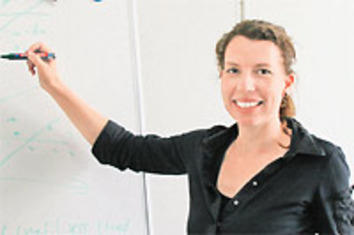Small Variations Make All the Difference
Irene Nagel studies the effects of aging on the brain.
Sep 24, 2010
Irene Nagel can see thoughts. With evident focus, neuroscientist Nagel looks at various images of a brain, comparing the orange-red blotches on each. The images were taken using functional magnetic resonance imaging (fMRI).
“When you think about something in particular, at least one region of the brain is more active than others,” explains the young researcher. “These differences in activity levels, which we can measure using tomography, can be seen later on in the images, where orange-red areas depict relatively stronger brain activity.”
Nagel is a postdoctoral researcher in the Emotional Psychology and Affective Neuroscience division of the Department of Psychology at Freie Universität. For her dissertation, which she wrote at the Max Planck Institute for Human Development, her research included studying the brain activity levels of 30 younger people and 30 older ones. One group was made up of study subjects between the ages of 20 and 30, and the other of study subjects aged 60 to 70. The results of her research confirm what some seniors show by example: Even in advanced age, it is possible to achieve excellent performance. That is shown by brain activity patterns similar to those of young adults. The young researcher’s work should also help scientists find out more about the factors that keep us mentally acute as we age. For her research on aging, Nagel has now been nominated by the Körber Foundation for the prestigious Deutscher Studienpreis (German Dissertation Award) for 2010. She has reached the final round, with 25 other nominees – out of an original total of 391 candidates.
Many changes accompany the aging process – including in the brain. Working memory declines more sharply than other mental functions. It is the type of memory we need in order to temporarily store information – like “short-term” memory – and process that information so that we can perform complex tasks. If, for instance, we are asked to spell words backwards in our minds or add up a series of numbers, the information has to be “moved around” in the mind.
High Mental Performance Can Be Achieved Even at an Advanced Age
Working memory performance and capacity vary from person to person, even at a young age. Over the course of an adult life, the differences become more pronounced, as performance dwindles more sharply in some people than in others. Previous research on aging, particularly in the cognitive neurosciences, has tended to leave these individual variations within an age group unconsidered. Nagel, however, focused on exactly these differences, which had previously been neglected: “I believe that this area is key to gaining important findings regarding maintaining mental acuity in the elderly.”
Together with an international research team, the 31-year-old Nagel performed her study at the Max Planck Institute for Human Development. Participants were asked to study spatial patterns of varying levels of difficulty and recall them a short period later – a task that draws upon visual and spatial working memory. Using the fMRI images, the researchers determined not only which areas of the brain were activated to complete the tasks, but also how levels of brain activity change with the difficulty of the task, meaning how well the working memory adjusts to the challenge it faces. In the process, it became evident that in subjects with high performance, brain activity increased as tasks became more difficult, meaning that the activity was well adjusted to the task – regardless of age. Among older subjects with lower performance, especially, the ability to adjust was not as good.
This means that differences in performance between individuals are associated with differences in the adaptation of brain activity to the difficulty of the task. “To us, the most important finding was that the differences were especially large among older adults in particular, meaning that quite a few of them performed very well. Future research will try to pinpoint the causes of this difference,” Nagel says. To that end, researchers will focus on which genetic factors and lifestyle differences can lead to differences in the aging process.
Further Information
Freie Universität Berlin
Department of Psychology
Emotional Psychology and Affective Neuroscience division
Habelschwerdter Allee 45
Rost- / Silberlaube — Room JK 26/225
14195 Berlin
Office: Heike Netzer
Telefon: (030) 838-557 15
E-Mail: heike.netzer@fu-berlin.de

